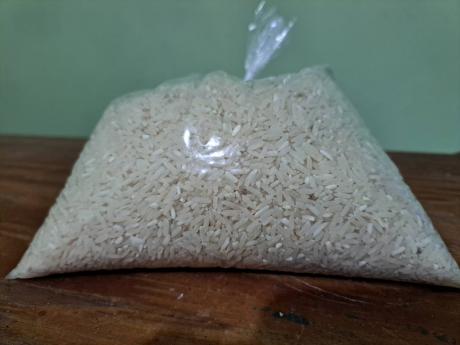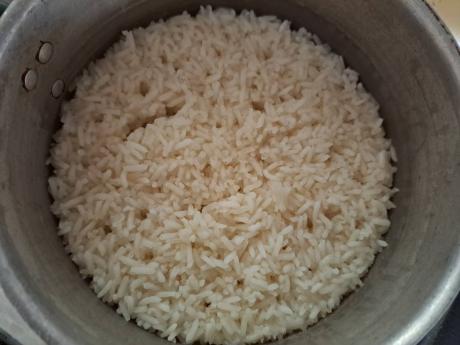Bad rice concern
Consumers bemoan ruined meals, sick stomach from spongy, inedible grains
WESTERN BUREAU:
Consumers are expressing concern about the poor quality of unlabelled bulk rice being sold in wholesales and supermarkets in western Jamaica, and are calling on the regulatory authority to remove the product from the market.
Across three western parishes, persons have shared their experiences with The Sunday Gleaner of ruined meals, as the packaged product contains questionable residue; while the rice is hard to cook and is sometimes spongy; is inedible even after careful, lengthy preparation; and some persons complain of feeling unwell after eating it.
Packaged in clear plastic bags, they say they have no means of knowing who the supplier is in order to seek redress.
Ralston Whyte, a resident of Montego Bay in St James, said the bulk rice he bought at a wholesale last month had a strange spongy texture when he tried to cook it.
“I was cooking my Sunday dinner, and while the rice was cooking, at one point, I turned it in the pot. When I looked at it, I saw the rice becoming spongy. I saw some white grains like they couldn’t cook, so I decided to chew it, but chewing it, the rice was not dissolving. I took it to my spouse and said, ‘chew some of this rice’. After chewing the rice, she had to spit it out,” Whyte shared with The Sunday Gleaner.
“The rice has some white grains in it. If you look at it before cooking, you can’t see it, but when you cook it, that’s where the problem is.”
He continued, “When you eat it, it actually makes your belly puffy. By tasting and chewing, that’s how I found out how bad it was. While cooking it, the rice looked spongy so I was throwing water on it and it was still not cooking. They have to do something about this. They can’t have consumers eating these things.”
Ingrid Grandison from Westmoreland was forced to stop buying bulk rice and switch to a branded product because she could no longer stomach the bad, “smelly” rice.
“It always has this odour and I always have to pick so many things from it before washing it, and if you are not careful and watch it every five seconds, it turns into porridge or dumpling. Even when you finish cooking it, it has a smell,” Grandison said of the bulk product.
Trelawny resident Conesia Ambersley recalled how her sister also switched to branded packed rice after an unpleasant experience trying to cook the unlabelled bulk grains.
“All the supermarkets my sister went to in Falmouth had this rice that wasn’t nice when cooked. The grains appeared broken and it just did not look or taste right when cooked, so she stopped buying it and bought another rice instead,” Ambersley explained.
BSJ TO LAUNCH INVESTIGATION
The Sunday Gleaner acquired packages of the unlabelled bulk rice, along with packs of branded rice, and the comparison revealed stark differences in the products. Unlike the clean rice in the branded packages, several grains in the unlabelled products were discoloured or outright blackened. It needed to be sieved and washed thoroughly to remove the bad kernels.
When concerns about the substandard rice on the market were brought to the attention of Julia Douett, the director of standards at the Bureau of Standards Jamaica (BSJ), she said the regulatory authority would immediately launch an investigation into the claims.
“The supermarkets will be asked to withdraw the rice from sale, so the customers will not be exposed to inferior quality products,” she explained of the action that can be taken.
She also noted that the agency has been working on a policy to ensure that all rice packaging is properly labelled to ensure that consumers have access to strictly quality products.
“We have just adjusted our standard to say all rice should be labelled, and that has been in the pipeline for some time. That came out of a concern that arose a few years ago, so we’re at the point now where we’re trying to look at ‘how does it impact the society?’ and how to implement the standard now, so it’s about how to make it work for everybody,” Douett told The Sunday Gleaner.
HISTORY OF BAD RICE
In 2016, concerns were raised about the quality of the rice on the market when shoppers in Manchester reported unknowingly purchasing so-called “plastic rice”, which they said was “stretchy” when cooked.
In response to the reports, the Jamaica Customs Agency announced that it would temporarily halt the clearance of rice at all ports of entry, pending a meeting with the relevant regulatory agencies to investigate the claims.
Subsequent tests revealed no evidence of substandard rice on the Jamaican market, though it was disclosed that rice being supplied from outside of the Caribbean Community would be subjected to further tests before being released into the domestic market.
Then two years ago, fears about substandard rice on the market resurfaced, after a shipment of rice at the ports reportedly failed to meet certain quality checks, including moisture content and level of broken kernel.
This prompted Minister of Industry, Investment and Commerce Senator Aubyn Hill, under whose ministry BSJ falls, to announce last year that the Government was working to address the issue of imported substandard commodities which have found their way into the Jamaican market.
He said checks revealed that there were 137 importers of rice in Jamaica, who were all in breach, and that all the imported rice was supplied by the same place.
Suriname and Guyana accounted for 90 per cent of rice imported into Jamaica in 2021.
In July 2023, the BSJ released new draft standards for the US$56-million (J$8.7-billion) rice importation sector. The draft report spoke to the need for the popular staple to meet safety standards for human consumption, packaging, and testing of samples.
“This standard establishes requirements for grades of paddy, cargo rice, milled rice, cargo parboiled rice and milled parboiled rice. It also specifies the general conditions for sampling and the methodologies for assessing the various factors used in the determination of the quality of rice,” read a section of the BSJ’s Jamaican Standard Specification for Rice report published in June last year.
KEEPING BAD PRODUCTS OFF THE SHELVES
Consumers like Whyte believe that the BSJ’s investigative process into reports of substandard commodities on the market must encompass major food manufacturers and distributors to ensure that once removed, these products do not find their way back on the shelves.
“They have to find a substantive way to investigate these things. They have to find a way to investigate these big merchants, because they have a stockpile of these products, and if there is anything found, they take it off the shelves, and you don’t see it for a period of time, and when people start to relax, the items come back,” Whyte charged.


